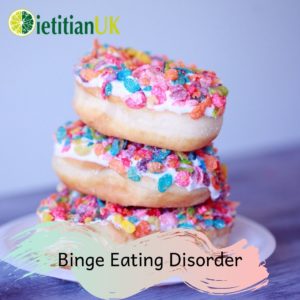Many people talk about having a binge but binge eating disorder (BED) is something that us not well-known about. Almost the black sheep of the eating disorder tribe. Struggling with this disorder can be debilitating, embarrassing and very hard to manage socially, hence I wanted to highlight it on Eating Disorders Awareness Week.

First what is a binge?
It isn’t eating 3 doughnuts.
It involves eating a large amount of food, often very fast, when not hungry, past fullness and in an “out of control” manner. Stopping mid-way through a binge can feel impossible. Often the binge is planned and usually carried out in secret, alone. Then afterwards come feelings of disgust, guilt and shame.
This differs from Bulimia Nervosa as there are no compensatory methods to try and fix the binge with exercise, being sick etc afterwards.
Warning signs to look out for in friends and family:
- hoarding stashes of food, maybe their cupboards are very full or they have a secret stash.
- buying large amounts of carbohydrates/sugary/high fat foods.
- struggling to eat with others and choosing to eat alone.
- having unusual food rituals.
- always seeming to be on a diet and following the latest fad.
- having low self esteem.
- weight that cycles up and down frequently.
- having to plan their life around food.
- seeming to be withdrawn and isolated.
- not liking their body.
- 2/3 of people are obese.
Where to go for help?
Recovery from BED is complex, it will take time and a team of professionals so please do not think you can do this on your own, do ask for help. Therapy such as CBT is important to help you learn new methods to cope and ways to look after yourself safely.
The role of a dietitian often comes after some initial therapy. Working on a regular meal patterns, looking at what foods are triggers for binges, what situations and times of day and so how to minimise these. There are ways of eating that may help you stay feeling fuller and minimise the risks of a binge. Working on breaking those dietary rules and rituals but replacing them with new helpful ones. Then looking at reintroducing those binge trigger foods in a safe way.
Hi Priya
Thank you for highlighting this disorder. I have a few patients in this category and we found they needed more ’round-the-clock’ support. One patient told me of Overeaters Anonymous and since then I’ve been suggesting this group for extra support from like minded people. (NICE suggest self help groups)
Its disheartening when someone in clinic finally gains the courage to tell someone of ther ED, and as a RD you know they won’t get the help from ED services due to not being dangerously underweight.
A couple of my patients have gone to OA and it has turned things around for them their binges are far less and seems to be less judgement and guilt from them.
I feel it is not for all patients but making them aware of it leaves that decision up to them.
Thankyou Ellen for your insightful comment. I agree it is hard when you are aware services are not able to give everyone the help they need. It can feel to some peopel that they need to be sicker to get help, which is not how we want things to be. I have also have people get great help via OA and others who do not like it at all. As with most things in nutrition, there is no one strategy that works for all. Lovely to connect with you, if you are on instagram it would be great to chat further.